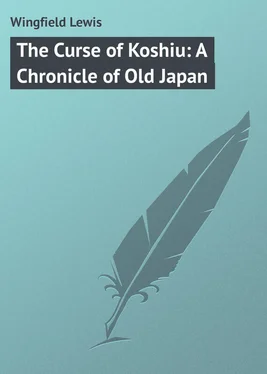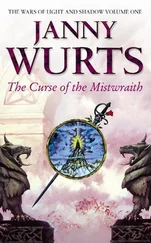Lewis Wingfield - The Curse of Koshiu - A Chronicle of Old Japan
Здесь есть возможность читать онлайн «Lewis Wingfield - The Curse of Koshiu - A Chronicle of Old Japan» — ознакомительный отрывок электронной книги совершенно бесплатно, а после прочтения отрывка купить полную версию. В некоторых случаях можно слушать аудио, скачать через торрент в формате fb2 и присутствует краткое содержание. Жанр: foreign_prose, на английском языке. Описание произведения, (предисловие) а так же отзывы посетителей доступны на портале библиотеки ЛибКат.
- Название:The Curse of Koshiu: A Chronicle of Old Japan
- Автор:
- Жанр:
- Год:неизвестен
- ISBN:нет данных
- Рейтинг книги:3 / 5. Голосов: 1
-
Избранное:Добавить в избранное
- Отзывы:
-
Ваша оценка:
- 60
- 1
- 2
- 3
- 4
- 5
The Curse of Koshiu: A Chronicle of Old Japan: краткое содержание, описание и аннотация
Предлагаем к чтению аннотацию, описание, краткое содержание или предисловие (зависит от того, что написал сам автор книги «The Curse of Koshiu: A Chronicle of Old Japan»). Если вы не нашли необходимую информацию о книге — напишите в комментариях, мы постараемся отыскать её.
The Curse of Koshiu: A Chronicle of Old Japan — читать онлайн ознакомительный отрывок
Ниже представлен текст книги, разбитый по страницам. Система сохранения места последней прочитанной страницы, позволяет с удобством читать онлайн бесплатно книгу «The Curse of Koshiu: A Chronicle of Old Japan», без необходимости каждый раз заново искать на чём Вы остановились. Поставьте закладку, и сможете в любой момент перейти на страницу, на которой закончили чтение.
Интервал:
Закладка:
His decision was a relief, in other ways, as the two friends agreed, pattering side by side in the quiet of the night. It was vastly heroic on their part, considering what had already been undergone by the other elders, to declare that they would cast themselves in the breach. If my lord Sampei could be induced to interest himself, they would be the bearers of his missive to his brother, and so gain credit in the town for wondrous' devotion to the people's cause. Not that for them there would be real danger (they had made up their minds of that), for No-Kami, however ferocious, would surely refrain from maltreating his brother's messengers. And yet now as they walked along, it seemed wise to give up the risk. Caution becomes old men. The independent Koshiu was resolved to make a journey on his own account: clearly there was nothing to be gained by everybody going. They would let him go, for obstinate men will have their way. All things considered, themselves having gained credit by proposing to go, would stop at home and do honour, by-and-by, to the escaped elders, when released.
This much satisfactorily settled, they gabbled of other things. Only to think of that little Miné being so clear-headed. Verily love works wonders. A comely maid, if unduly ambitious, and warm, to boot, of temper. How her blood mantled at her father's railing. How undaunted was her defence of the young General. She must love him much to be stung into bearding, for his sake, her sturdy parent. He must have won her heart before he sailed, and had long since, no doubt, forgotten her.
A silly wench to look so high. A great General might stoop to pluck a flower as he passed, but, loosely caught, it would speedily fall from his breast, and he unwitting of the loss. She certainly was pretty; would develop some day, obstinate and headstrong like her father, into a shrew. Yes, she was young and fair to look upon at present, and, perhaps, were she so brazen as to cast herself at the young man's feet, he might deign to raise her for a moment.
Chattering thus, the cronies parted, each trudging his own way by the glimmer of his paper lantern. Could they have delved into the mind of the farmer's daughter, and have seen what was passing there, they would have had genuine cause for wonder.
Miné, as with frowning brow and dejected step she moved among the stones in the garden, struck her palms impatiently together.
"I cannot bear it, and I will not!" she muttered. "Hard and unjust and narrow is my father! Of these taunts there shall be an end. I gave my heart to him to trample on, and do not regret the gift. His I am or no one's until death. Each day and hour to hear him and his reviled and vilified, is constant torture. I will leave a home that is not to be endured, and take refuge for the present with the Abbess."
Miné was a true daughter of Koshiu. Once her mind made up, there was no further indecision. Wrapping a mantle around her, she moved on tiptoe to where her three brothers slept, and then stealing forth into the night, closed the shutters behind her.
"Adieu, my darlings, perchance for ever!" she murmured tenderly; "for better or for worse the die is cast. He will soon visit the temple to see the mother whom he loves. If he will have me, I am his, to do with according to his pleasure; if not, I will remain to pray for him within the temple, in the garb of Buddha's handmaid."
CHAPTER III.
MARRIED LIFE
The meek obedience of O'Tei to her father's wishes was but ill requited. The gulf between past and present was so wide that for a while she was dazed and stunned. It seemed to her that she must have passed in sleep through the gates of Death, and have been born again into a new dark world-desolate and drear-which was all evil. How calm and happy by contrast appeared that other life, as she recalled to mind the company of prim priestesses slowly floating in the dance; the lazy, sweet-tempered bonzes tinkling on bells, droning amiably through noses-their weightiest duty, adoration of the sun with foreheads in the dust; their loving labour, the cleaning of temple precincts; their pastime, the gentle craft of gardening. Now she found herself surrounded by a roistering crew of fierce, rough, ignorant retainers-scowling, swearing, swaggering samurai-swash-bucklers who were eternally cleaning and polishing their two swords and dirk, or practising some horribly nimble feat of arms, or with set teeth in sudden rage like red-eyed rats flying at one another's throats.
Nuptial pomp and ceremony over, bride and groom retired to their castle, where, with the laudable intent of making other magnates jealous, a series of sham fights and sumptuous jousts were inaugurated, whose unaccustomed din confused the brain of the chatelaine. For a space No-Kami appeared in his best light, for he was subjugated by the beauty of his young wife, and unconsciously a little afraid of her quiet high-bred demeanour. Bravely she strove to interest herself in his pursuits; with unflagging patience watched the retainers wrestling or riding at the ring; compelled herself to bestow applause on bouts at quarter-staff which wearied her. And yet, discipline herself as she would, the constant thud of stick on skull, or blade on helm-the guttural shrieks and execrations-chilled her to the marrow. There could be no sympathy 'twixt the sensitive and poetic nature reared in the sacred groves, and these grim and savage warriors. And, sharp to read faces, if ignorant of letters, they knew it as well as she, for her virtues were strange riddles beyond their comprehension. What they could be sure of was that their lady was regrettably white and slender, – too soft and delicate for a hard world of struggle, where the weak were deservedly mangled. Sorrowfully they compared her with the late chatelaine, unhappily deceased, the lioness Tomoyé, much (as is the usual practice) to the disadvantage of the living one. There is nothing that such men hold in more withering contempt than weakness. The chivalry of mediæval Europe was mostly theory. Discontented, they did their liege lady a pathetic and grudging service, ashamed of her as unsuited to her station.
One day as she sat listless, wondering at the emptiness of life, No-Kami strode into her bower to claim admiration for a new and wondrous sword, fresh from Sanjo's anvil. In his nervous grasp it whizzed through the air with diabolic whistling sound, as he showed exultantly how he meant to slash off the head with it of the Daimio of Bizen, and other abominable rivals.
Now although O'Tei, in careless girlish fashion, had been rather fond of watching the armourers at work (the more perhaps because of the disapproval of sniffing gorgons), she had never clearly associated the results of their skill with their true purpose. She had always been bidden to observe the spring of the glittering blade, the clouded lines so deftly worked into the steel; the patterned kogai or stilettoes fitted in the scabbard; the elaborately ornate tsuba or hilt-guard; and saw as she admired details beautiful works of art fit to adorn a dwelling. But now when she beheld her husband making fierce passes, with a blood-curdling expression of ferocity upon his face, she became aware, for the first time, of his animal greed for blood, and shuddered as she looked, turning a shade more pale. To this wild beast she had been tied for life. What sort of existence could she hope for in the future? Would it be possible to go on to the end pretending to sympathise with that which in her heart she loathed? Power, unless kept in leash by thongs and bridles, degenerates into a tyranny that, feeding on itself, grows every day more infamous. She had learnt by report that her lord was a tyrant, and disliked by many, though as yet she knew no details.
She had been taught vaguely by the learned bonzes that the human animal is by nature a beast of prey, blood-raw till cooked by education. The man before her was as ignorant, and more lawless than his own retainers. Was it her task to show him the right path? – to wean him to better things by gentle influence? A noble mission, for one who was strong of purpose, firm of will. The girl resolved that she would try, but felt, with a sinking of the heart, that the task was beyond her strength. No-Kami discerned upon her features a look of pained bewilderment out of tune with the occasion, and bluntly growled his discontent. He was surprised and angry. When a chatelaine is called on to sympathise and exult with her lord, why does she show disgust? It came suddenly upon him that there was a barrier between them which, though intangible, neither might ever pass. A pretty helpmeet for a Hojo was this degenerate child of Nara's! Strolling through the well-appointed armoury, displeased and concerned, he selected the light silver-mounted lance which his grandam had used to splendid purpose when, in the absence of her spouse, she defended this very castle. More doughty even than the much-regretted Tomoyé had been this grandam, and no wonder, for, of noblest lineage, was she not the direct descendant of that famous Empress Jingo, who, leaving her new-born babe in the charge of her ministers, sallied forth armed cap-à-pié to conquer Corea?
Читать дальшеИнтервал:
Закладка:
Похожие книги на «The Curse of Koshiu: A Chronicle of Old Japan»
Представляем Вашему вниманию похожие книги на «The Curse of Koshiu: A Chronicle of Old Japan» списком для выбора. Мы отобрали схожую по названию и смыслу литературу в надежде предоставить читателям больше вариантов отыскать новые, интересные, ещё непрочитанные произведения.
Обсуждение, отзывы о книге «The Curse of Koshiu: A Chronicle of Old Japan» и просто собственные мнения читателей. Оставьте ваши комментарии, напишите, что Вы думаете о произведении, его смысле или главных героях. Укажите что конкретно понравилось, а что нет, и почему Вы так считаете.












